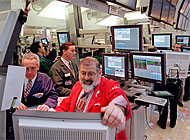Swiss economy shaping up well for 2001

The Swiss economy looks set to prosper in the new year, after continuing its recovery in 2000 with a growth rate of more than three per cent. Prospects are bright providing the United States economy does not fall into recession.
Overall, the Swiss economic indicators last year were good. In June, unemployment fell below the two per cent level for the first time in around eight years with some forecasters predicting a return to full employment.
In some sectors, such as finance and information technology, the problem now is a shortage of skilled staff.
Coupled with the good news on unemployment is an inflation figure of just 1.6 per cent – well within the Swiss National Bank’s definition of price stability.
“The Swiss economy is in very good shape,” says Cantrade private bank economist, Marcus Allenspach. “We had above average growth in 1999 and the first half of 2000 and private consumption expenditure has been very strong”.
Allenspach added that the outlook for 2001 is also promising, although the economy is slowing down.
“We are a sprinter rather than a long-distance runner,” he told swissinfo. “So we can’t expect the rate of growth we saw in the first half of 2000. We saw growth peak at 4.8 per cent in the fourth quarter of 1999 and we’re now down to around two per cent. I think that kind of rate is sustainable in 2001.”
The growth rate had led to fears that price stability was in danger but the Swiss National Bank’s tightening of monetary policy over the year seems to have had the desired effect.
And most analysts agree that although headline inflation is set to increase because of higher fuel prices, core inflation is well under control.
They add that, for the time being, interest rates have probably reached their peak.
“The US Federal Reserve has made it clear that the next interest rate move could be downwards,” explains Allenspach. “And in Europe there is no mandate for a more restrictive policy so it’s unlikely that the SNB will raise its rates and risk an appreciation of the Swiss franc.”
The weakness of the franc against the dollar boosted Swiss exports to North America tremendously in 2000 and also helped offset the currency’s appreciation against the euro.
The recent slowdown in the US economy and a more harmonious line on the euro from Europe’s policymakers is expected to see the dollar weakening further in the early part of the New Year.
“History tells us that once the dollar enters a period of correction, it can fall very fast,” says Allenspach. “After the Russian financial crisis in 1998, the dollar went down from SFr1.45 to SFr1.30 in just seven weeks.”
A weaker dollar will certainly be in Washington’s interests if it is to avoid a hard landing after the economy’s prolonged period of expansion.
That, in turn, could mean the euro bouncing back very quickly and even testing the parity level with the dollar.
The Swiss franc is also expected to regain some lost ground against the American currency.
Overall, the 2001 outlook for the global economy still appears good as long as the US can avoid that feared hard landing.
by Michael Hollingdale

In compliance with the JTI standards
More: SWI swissinfo.ch certified by the Journalism Trust Initiative
You can find an overview of ongoing debates with our journalists here. Please join us!
If you want to start a conversation about a topic raised in this article or want to report factual errors, email us at english@swissinfo.ch.